If you’re worried about your child’s weight or changing body shape as it relates to their eating habits and/or activity level, you’re not alone. Parents, more than ever, are concerned and seeking guidance. My concern as a pediatric dietitian though, is that parents are turning to restrictive weight loss diets to control their child’s weight. Here’s why I don’t recommend doing that, and what to do instead…
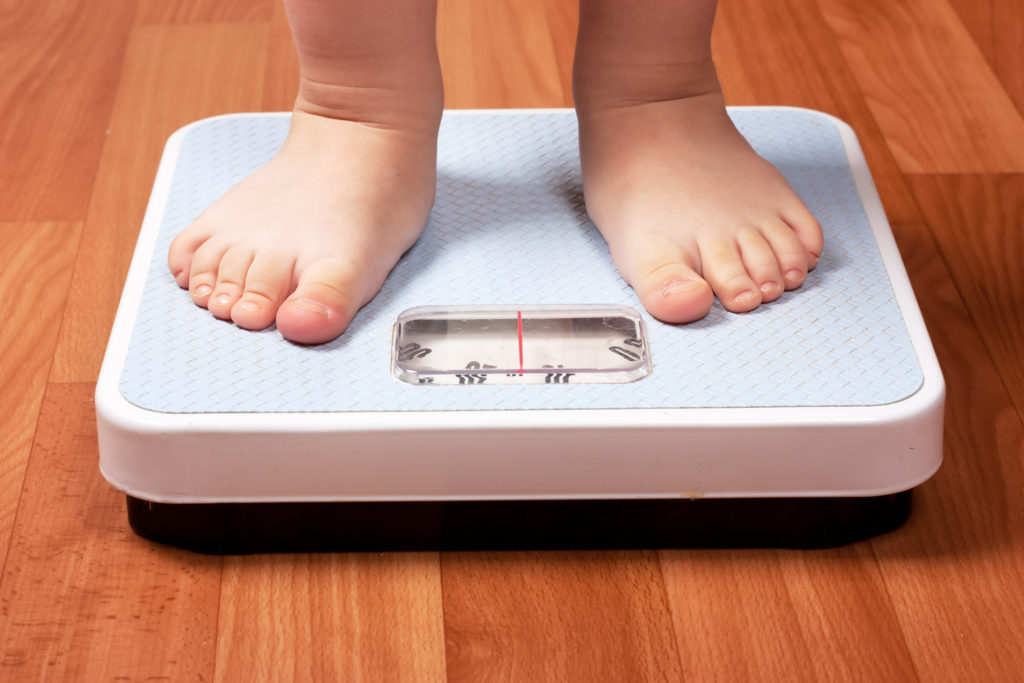
More than ever I am seeing parents who are concerned about their child’s weight, shape, size and food intake. They wonder if their child overeats, and what to do about it. I often turn to both “food neutrality” and “intuitive eating” as my guiding lights with these families, to ease their worries and arm them jump with strategies and tools that will help them to raise healthy, intuitive eaters who have a positive relationship with food and body long term.
Need personalized nutrition support?
Book an appointment with one of our pediatric dietitians today!
Here’s what you’ll learn in this post:
- Why diets don’t work
- How and why to heal your own relationship with food
- How to teach your child to be an intuitive eater (and why this is important)
- Why to drop labels when it comes to foods
- How and why to respect your child’s hunger and fullness
- Why routine and consistency are so important
- Why it’s so important to practice (and teach) body acceptance
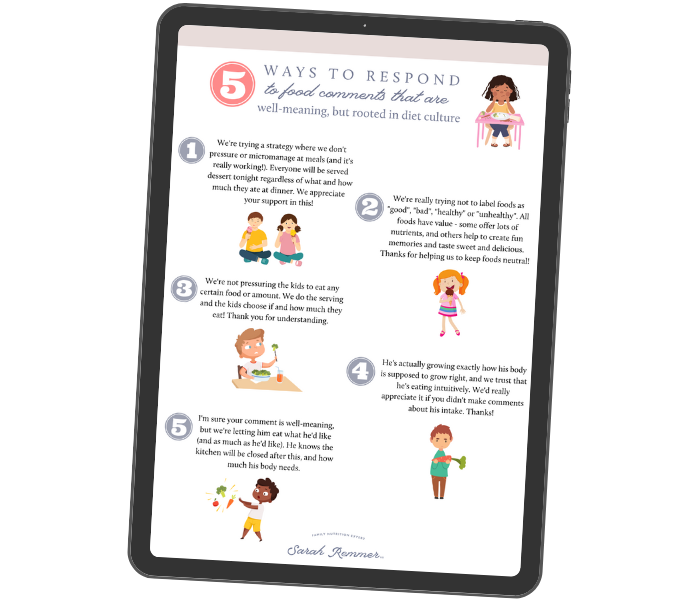
Parent of a pre-teen or teen? Need help navigating the muddy waters of body image?
You’re in the right place. Sign up for my emailing list to get my scripts printables collection directly to your inbox (for free!).
Diet’s Don’t Work
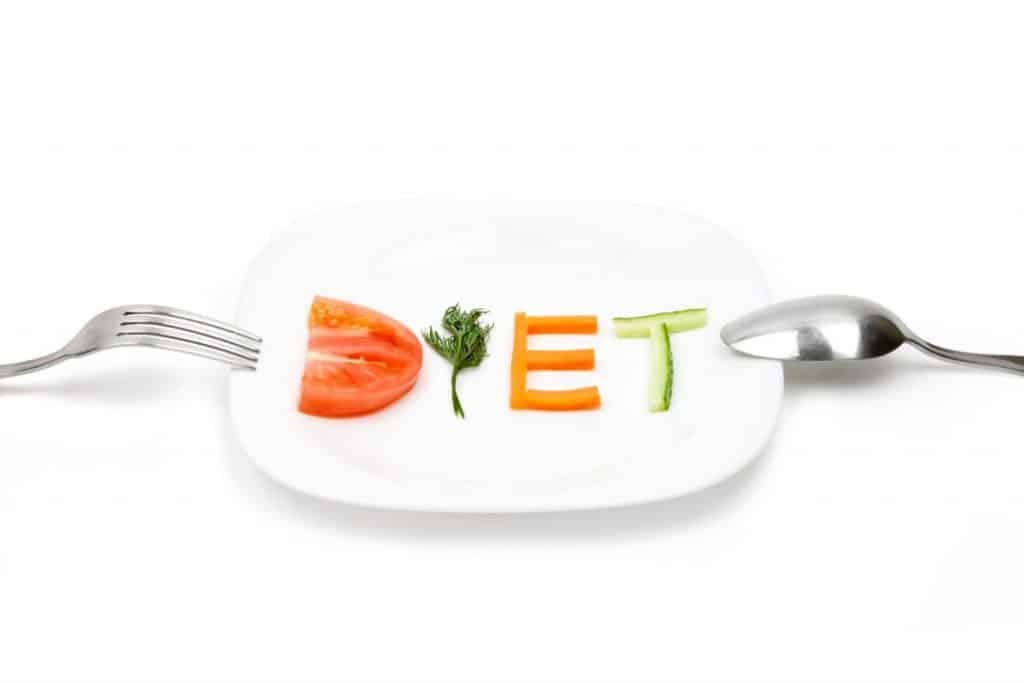
Let’s cut to the chase and just call a spade a spade. Weight loss diets, like fad diets, quick fixes, and the dreaded cleanse, don’t work long term. Sure, you may see a sudden decrease in weight, usually attributed to a shift in water, or maybe it is legit weight (fat, or muscle mass loss), but nine times out of ten, it’s not sustainable. The best diet is quite honestly, not a diet at all–it’s a lifestyle that includes a variety of foods everyday, some favourite pleasurable foods and some mindful eating practices (along with enjoyable movement). Eliminating favourite foods or avoiding whole foods (or food groups) is simply not the answer, especially for kids.
The only thing food restriction will do, is increase a child’s chances of developing an eating disorder. According to the American Academy of Pediatrics children should not be prescribed weight-focused care due to the potential for harm, but instead should be given the opportunity for more family-focused meals and activities. So, when possible enjoy mealtime as a family! It’s also important to remember that kids need to grow! Dieting during childhood can lead to a lifetime of chronic dieting or weight cycling. And weight cycling, or “yo-yo” dieting, likely increases the risk of cardiovascular disease.
So, instead of researching how to get your child to lose weight, or which weight loss plan to put them on, do this instead:
Heal your own relationship with food
We ALL want what’s best for our kids and our intentions are always good. We want to protect our kids and we want them to grow into the healthiest versions of themselves. But sometimes when we do things or say things out of fear, it can perpetuate negative cycles and actually set our kids up for more challenges down the road. Sometimes it requires some deep work and reflection to know (and act according to) what’s truly best for our little ones.
Ask yourself this: Do I have a healthy relationship with food? This is a loaded question, because eating and the food relationships are complicated. And this usually stems back to our childhood. Growing up, my mom was a Weight Watchers points counter (as many many moms back then were!), avoiding foods that were deemed too high in points and skipping meals (or seriously skimping on them) to save points for later. But when you take the “food” out of eating (aka taste, texture, experience, JOY), you’re left with numbers, guilt, shame and confusion. And even worse, with strict weight loss diets involving numbers, points and “good” and “bad” foods, you start to base your self-worth on how successful you are. And then the whole feeding relationship gets messed up!

If you were a kid who grew up thinking this type of thing is normal (hello fellow children of the 80’s and 90’s!), along with other standard feeding techniques such as “three more bites or no dessert” or “clean your plate before leaving the table”, your food relationship is likely a bit warped. Not your parents’ fault – that’s all they knew! But it’s time to take some steps to heal your relationship with food and shift your mindset so that you don’t pass these thoughts and patterns on to your kids. This takes time and patience. Emotional eating, eating in the absence of hunger, and yo-yo dieting are realities for many of us, and they are hard habits to break. A good place to start is learning about how to be an Intuitive Eater.
When you feel the urge to stop your child from eating more food at mealtime, or to say “no” to them having a 2nd (or 3rd or 4th) helping, please consider a few things …
First ask yourself: what are my fears? Where are they rooted? Do they stem from my own experience as a child? Are they rooted in diet culture? Are they truly warranted?
Remember: kids are growing and NEED food, regardless of size or shape
To put it bluntly, who are you to know how much food your child needs at a sitting? Or how exactly your child’s body will grow or how they will store energy? Because you really have no clue. Every child is unique and the way they eat, grow, and store energy is unique too (and dependant on so SO many factors). Your intervention here is not beneficial, even though it might be intuitive. Micromanaging your child to eat and move a certain way in order for them to be a certain size or weight can be damaging – both short and long-term.
Children are growing and developing, and they require energy and nutrients to do so. Their food intake will be all over the place, and their energy needs will vary drastically from meal to meal and day to day. This is normal, and also why it’s so important that we leave the “how much” up to them. We do not know how much they need. The amount that we see as being “appropriate” or “enough” is based on our own assumptions or “rules” that are likely rooted in diet culture. Who are we to determine how much our child requires for their unique needs and growth pattern?
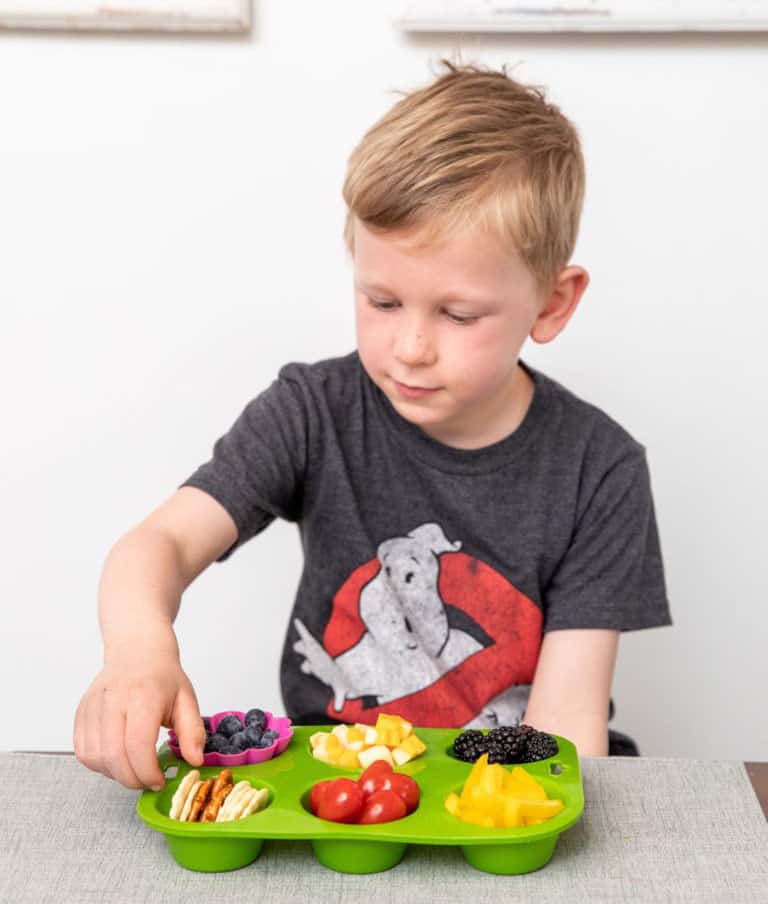
A child’s growth isn’t necessarily a clean, perfectly linear pattern. Sometimes we as parents have expectations of how they will grow, or what size/shape they will be (and how much food they need to get there). The truth is, if we allow it, most children will grow into the body they are supposed to.
When we limit a child’s food intake at meals, they will eventually stop trusting their body. What often happens is the OPPOSITE of what we want: compensatory behaviours like sneaking/hiding food, mindless eating, or over-eating outside of the home or when they can.
What if we focused on our jobs of feeding (what, where and when), and let our child do their jobs of eating (if and how much). What if we ditched all pre-conceived ideas of how much food our child should eat at any given time, and what their body should look like at any given time?
Listen, we ALL want what’s best for our kids and our intentions are always good. We want to protect our kids and we want them to grow into the healthiest versions of themselves. But sometimes when we do things or say things out of fear, it can perpetuate negative cycles and actually set our kids up for more challenges down the road. Sometimes it requires some deep work and reflection to know (and act according to) what’s truly best for our little ones. Trust your child to trust their own bodies. Empower them to listen and trust their intuition at meal and snack times. Teach them how to be an Intuitive Eater.
Teach your child to be an intuitive eater
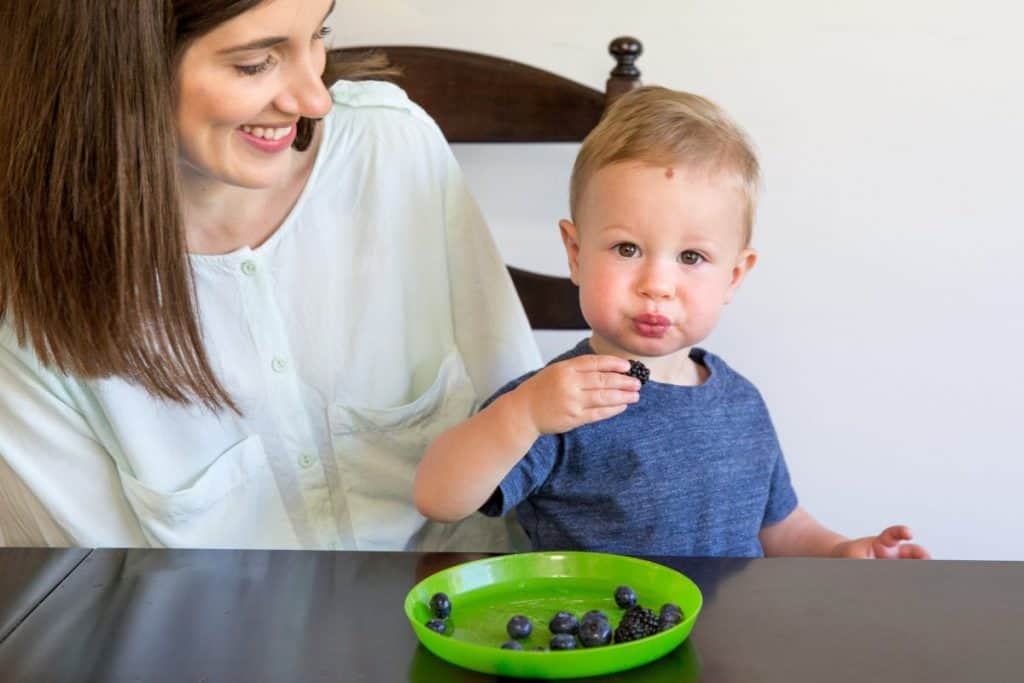
Kids are born intuitive eaters. From birth, they have the ability to listen to their own natural physical hunger cues and eat accordingly. Intuitive eating is all about eating when you start to feel hungry and stopping when you’re becoming full. Easy right? Well, no. Because as kids grow, their eating habits are influenced by more than just their internal hunger and fullness cues. External factors start to play a role, such as the sight or smell of food, parents/friend/sibling influence or advertising.
You may have heard, or said yourself, just have “three more bites”, tried to coerce food into your toddlers open mouth, or said “no dessert until you finish your veggies”. These are all feeding strategies that take away from your child’s natural ability to self-regulate. Pressuring kids to eat, labeling food as “good” or “bad”, or associating food with behaviour (using it as a punishment or reward), are all no-no’s on the path to becoming an intuitive eater. So, here’s what you should do instead:
Stay neutral and drop the labels
Call food by its name! Say “this is an orange and that is chocolate” versus “fruit is good for you, treats are bad”. Keeping foods on a level playing field takes away the pedestal. Because if you start labelling foods as “bad”, “fun food”, “sometimes food”, “junk food”, or “unhealthy food” you immediately make it more alluring and tempting, which increases the chances of your child wanting, fixating on, or sneaking that food. Also, most children think in very concrete terms (and don’t have the ability to think abstractly), so if you label a food as “bad” or “unhealthy”, what this might mean is that your child will start to think that they are “bad” or “unhealthy” if they eat it. All of a sudden, the foods that your child eats become tied to their value.
Don’t label food “good” or “bad” and keep foods neutral. This means, don’t praise your child for eating “healthy” food or reward them with a “treat”. Kids will quickly figure out that the healthy food must be yucky if they are giving me a sought after “yummy” food for eating it.

Respect their appetite
Just like your appetite changes from day-to-day so does your child’s! Some days they may ask for seconds of their supper and some days they may only take a couple of bites. And that is okay. Maybe they aren’t feeling well, maybe they had a more fulfilling lunch. The point is, it’s up to them to decide. Forcing kids to eat when they are not hungry will perpetuate the thought that they are only good when they clear their plate. And some research suggests that being forced to clear your plate in adolescence may result in increased chances of weight gain and obesity later in life. The bottom line is that appetite fluctuates for many many reasons! Instead of micromanaging your child at the table, trust them and their appetite. Remind them that this is their opportunity to eat, the kitchen will be closed after, and that the next opportunity to eat will be either at snack or mealtime in a few hours.
Have a routine and try to stay consistent
All kids thrive on a routine and consistency. They wake up, go to school, go to bed, repeat. Meal and snack schedules are also important when teaching intuitive eating. Learning to self-regulate comes from knowing what to expect in terms of timing of of meal and snack times. Allowing 2-3 hours (depending on the age of you kid) in between meals and snacks allows them to feel hungry, but not starving at the start of an eating opportunity. Kids who are allowed to graze throughout the day are unable to figure out their natural hunger and fullness cycles.
Practice Body Acceptance

A study conducted in 2016 asked 501 adult women between the ages of 20-35 to recall comments their parents had made growing up about their weight or eating habits. Not surprisingly, adults whose parents made weight-related comments were more dissatisfied with their bodies.
You are so much more than your weight, or the amount or types of food you eat. Bodies come in all shapes and sizes. And they’re all good. Kids are exposed to societal pressures just like adults. Lunchroom conversation about food, the comparison of bodies, and the desire to simply “fit in” are all pressures kids face each day. As a parent, you can’t completely protect your children from weight stigma, but you can control the conversation in your own home and of your own body.
What we say about our own bodies can become our kids’ inner dialogue as well. So, instead of focusing on things you may not like about your body, focus on the amazing things that it can do! Your body is amazing, strong, and unique! Remind your child that their body is perfect just the way it is, and it’s normal to change size and shape as they get older. Focus on what your and your child’s body CAN do (like cartwheels in gymnastics or swimming underwater!).
If you’re concerned about your child’s weight and feel that you need further guidance, please don’t hesitate to reach out to our pediatric dietitian team and The Centre for Family Nutrition. We’re happy to help!
Written by: Lesley Langille, MS, RD and Sarah Remmer, RD
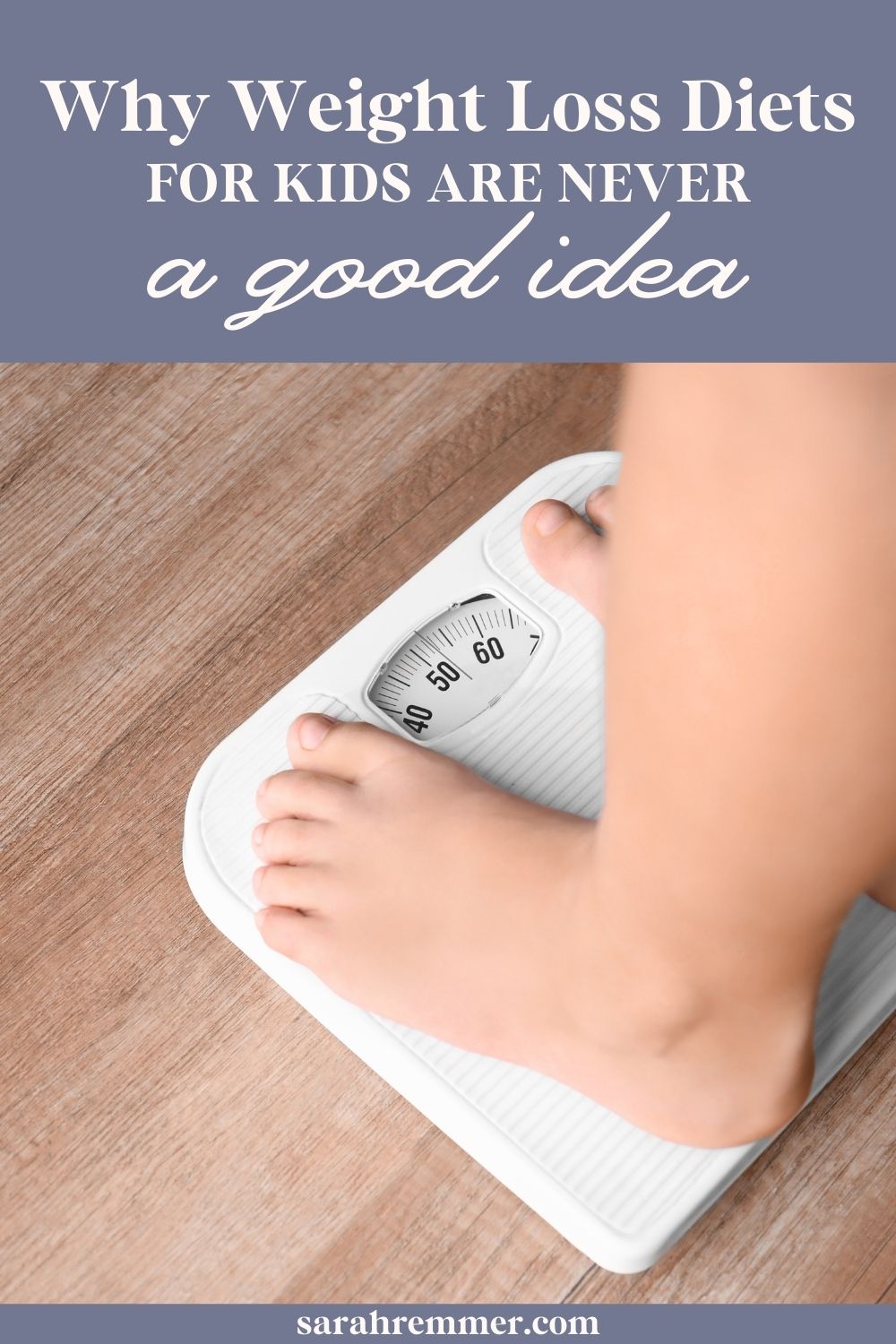
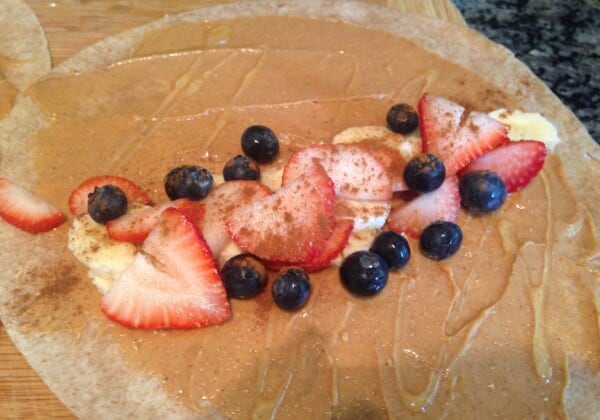



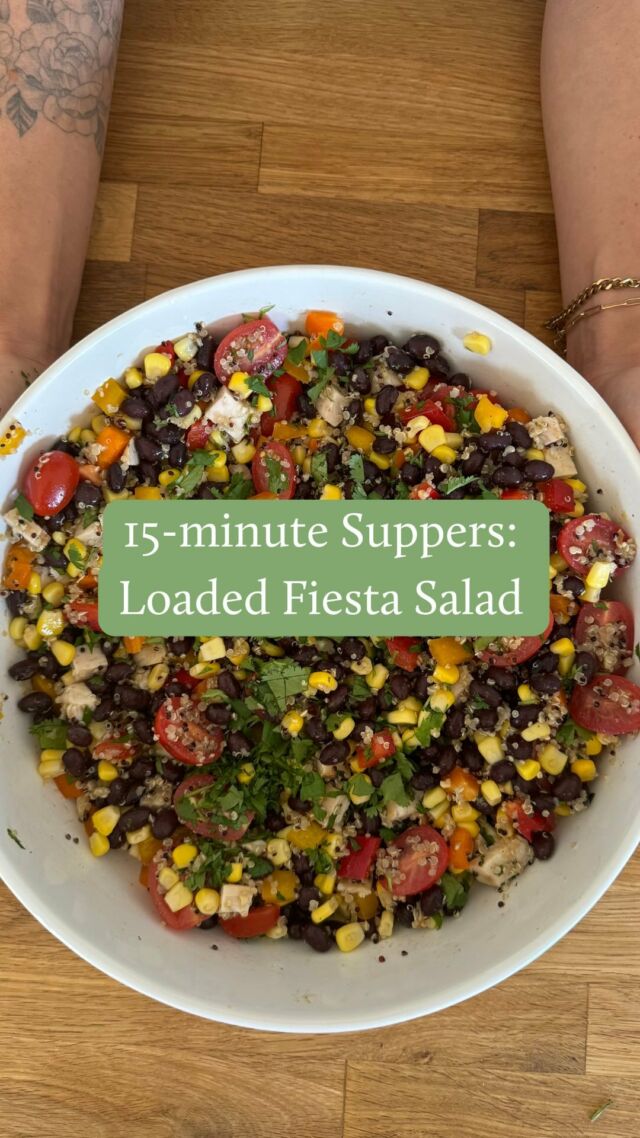

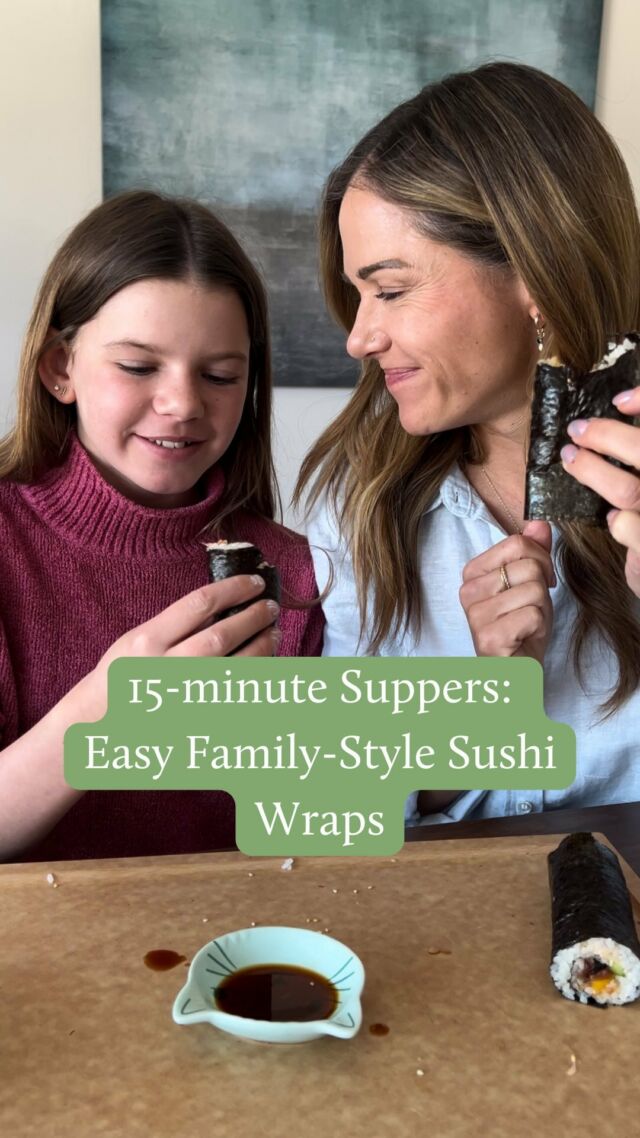

Comments
Asma Aslam says
Hi Sarah, I just finished reading your weight loss blog post, and I must say it was incredibly helpful! Your writing style is amazing, and I appreciate how you specifically tailored the advice for moms like myself. The tips and guidance you provided are practical and easy to implement. Thank you for sharing such valuable information— Keep up the fantastic work!
Sarah Remmer, RD says
Hi Asma, thank you SO much for taking the time to write such a nice comment. I appreciate it! Thanks for being here.
Nancy Lee says
We should set the model here and recuperating your own relationship to nourishment is the initial step. So essential to be talked about considering Kurbo. As a kindred dietitian and mother of a little child, I concur with this on all levels. You’re an extraordinary model.
Amy Gorin says
Fantastic post! I totally agree — such an important topic.
Ginger Hultin says
Yes, yes, yes – we need to be setting the example here and healing your OWN relationship to food is the first step. Awesome post –
Kara Lydon says
Thank you for this post! So important to be discussing in light of Kurbo.
Heidi Moretti says
I totally agree! Nice post.
Stacey Mattinson says
This is a great read! As a fellow dietitian and mom of a toddler, I agree with this on all levels. You’re a great example!